- Home
- Nick Carter
The Death’s Head Conspiracy
The Death’s Head Conspiracy Read online
NICK CARTER
The Death’s Head Conspiracy
Copyright Notice
This book was scanned and proofed by papachanjo. Use it only for reading and not for a gain of any sort. If you have any comments, feel free to send them to: [email protected].
If you have other Nick Carter: Killmaster novels and would like to add to the online collection, you just have to scan and send them to my email address and I’ll do the rest.
Table of Contents
Copyright Notice
Prologue
One
Two
Three
Four
Five
Six
Seven
Eight
Nine
Ten
Eleven
Twelve
Thirteen
Fourteen
Fifteen
Sixteen
Seventeen
Eighteen
Nineteen
Twenty
Twenty-One
Twenty-Two
Twenty-Three
Twenty-Four
Prologue
The island of Mumura was like a tiny green jewel set in the deep blue velvet of the South Pacific. Tucked away in the corner of the Tuamotu Archipelago, Mumura was one of the few Polynesian islands not subjected to missionaries and civilization. The Mumuran people were still free in the fullest sense of the word. No one had put constricting shoes on their feet or covered the fine brown breasts of their women. Some five hundred of them in all, they were unaware of the paradise that was their island, for they had known nothing else.
Almost the entire population waited now on the golden beach as a motor launch sliced through the gentle breakers toward their shore. In the bow of this foreign craft stood Atu, tall and straight and unafraid of the speed of the craft or the roaring engine, as befitted a chief.
As the launch swerved to a standstill a few yards off shore the men ran down to their chief, while the women remained up on the beach laughing excitedly among themselves and cautioning the children not to get in the way.
Stepping from the boat, Atu took a large suitcase from a crewman and waded into the water, holding the case chest high to keep it dry. The launch roared to life and sped back toward the white yacht riding easily half a mile out.
Atu strode up the beach bearing the suitcase proudly before him. He laid it on a stone his ancesters had used as a sacrificial altar, but which was now used as a rostrum.
The Mumurans crowded around. The musical cadence of their language rose with excitement.
Atu raised his hand for silence, and at once the only sound to be heard was the sighing of the late afternoon breeze through the palms. The white-haired chieftan smiled upon his people affectionately, and bent to open the clasps of the suitcase the way the white men on the big boat had shown him.
He ran his hand over the glossy brown material of the suitcase. It was like nothing he had ever touched, and Atu caressed it with wonderment. Then, seeing the impatience of his people, he grasped the lid at the two corners and raised it.
He brought the treasures out one at a time, letting the people savor each one. A length of cloth, unbelieveably pliable, and splashed with spirals of colors unlike any flower in Polynesia. Necklaces strung with marvelous stones that caught the light of the sun and shattered it into a rainbow. Little oblong packages of paper-wrapped strips that were sweet to the taste. Atu slipped one into his mouth and chewed to demonstrate as the white men had showed him. He passed out the other strips, seeing that as many children as possible got them. The wonders continued to come from the suitcase. There were things that bounced, things that glittered, things that made sounds. Each new treasure brought a pleased murmer from the crowd.
This would surely be a day long remembered on Mumura.
Aboard the yacht, now steaming away from Mumura, two men stood at the rail watching the receding island through binoculars. One was heavy and bear-like, with a tangle of black hair that needed washing. The other was taller, and thin as a whip, with silver blond hair brushed straight back from a high, smooth forehead. Although the men wore civilian clothes, there was something military in the way they held themselves. Behind the taller man sat an enormous German shepherd and a muscular black Doberman pinscher glaring at the world with hatred.
Fyodor Gorodin, the heavier man, spoke. “Why don’t we get it over with, Anton? We must be far enough from the island by now.” His voice was a harsh growl that increased his resemblance to a bear.
The silver-haired man, Anton Zhizov, lowered his glasses and nodded slowly. His tiny dark eyes were hidden in deep sockets beneath straight black brows. “Yes, I think the time has come.”
Zhizov turned to a third man who paced the deck restlessly behind them. “What do you say, Wamow? Are you ready?”
Knox Warnow was a slight man with stooped narrow shoulders that made him seem even smaller than he was. He had the pale, unhealthy skin of a man who seldom went outdoors.
“Yes, yes, I’m ready,” Warnow snapped. “I’ve been ready for the past twenty minutes.”
“Undue haste can be very costly,” Zhizov said smoothly. It should make quite a pretty picture now in the rays of the setting sun.” He turned to a young man in the uniform of a seamean. “Boris, tell the captain to hold us steady, I want to get photographs.”
The young man braced at attention. “Yes, sir.” He started to move forward to the bridge, then hesitated. “Sir?”
“What is it, Boris?” Zhizov asked impatiently.
“The people on the island. Will they have had time to evacuate?”
“People? You mean those brown-skinned savages?”
“Y-yes, sir. They seemed quite, well, harmless.”
Gorodin whirled from the rail, muscles bunching in his huge shoulders. “What are you whimpering about, boy? You were given an order!”
Zhizov held up a manicured hand. “Boris is young, Fyodor. He retains a touch of humanitarianism, which is not always a bad thing.”
He turned to the young seaman. “If we are to attain our goals, Boris, it is necessary that some lives be sacrificed. As you know, conditions for all the peoples of the world will be much improved by the changes we will make, so these simple natives will have given their lives for the good of mankind. Do you understand, my boy?”
“Yes, sir,” Boris replied, though doubt still lurked in his eyes. He marched forward toward the bridge.
“I don’t know why you bother to explain things to that one,” Gorodin growled. “An order is to be obeyed instantly. That is the way you and I were taught”
“We must recognize that the times are changing,” Zhizov said. “We will need the bright young men like Boris when we are in power. It would be unwise to alienate him now.”
The pitch of the engines changed, and the yacht slowed. At the slight shift in equilibrium the two dogs braced their legs and snarled, confused by the unsteady footing. Zhizov snatched the end of their double leash from where it was looped over the rail and lashed both dogs across the muzzle. They cringed back against the cabin bulkhead, black lips drawn away from the strong white teeth in soundless snarls.
“I don’t know why those dogs don’t tear you apart, the way you treat them,” Gorodin said.
Zhizov gave a short, barking laugh. “Fear is the only thing these beasts understand. They would kill for me on command, because they know I have the power to kill them. You should learn more of psychology, Fyodor. With a young man like Boris, one must be patient. With these pretty devils, only cruelty works.” Once again he lashed the leather cord across the faces of the dogs. They made no sound.
“If you’re through playing with your pets
,” Warnow said with heavy sarcasm, “I will get on with the demonstration.”
“By all means. Let us see if all the time and money we have invested in you will pay dividends.”
Warnow dug a hand in his pocket and pulled out a black leather case. From this he took a thin cylinder of metal, six inches long and tapered to a point at one end. “This is the electronic stylus,” he explained. “With this I manipulate the triggering mechanism, an intricate series of adjustments that only I know”
“Do we need all this talk?” Gorodin complained. “Let’s see the action.”
“Be patient, Fyodor,” Zhizov said. “This is Mr. War-Bow’s big moment We must let him enjoy it to the fullest After all, if his project should fail, what remains of his life will be most unpleasant” “It won’t fail,” Warnow said quickly. “You must remember that this is one of my less destructive devices. Still, it will be more than adequate for an island the size of Mumura.” Holding the electronic stylus in one hand, he began to unbutton his shirt. “The beauty of it is that even competent customs inspectors would never have found a bomb in that suitcase, because there is no bomb there.”
“We know all this,” Gorodin broke in impatiently. Warnow continued as though there had been no interruption. “There is no bomb among the trinkets because the suitcase itself is the bomb. Soft, pliable, workable into any number of shapes, the ultimate extension of the plastique explosive principle—fissionable nuclear plastic. The detonating device is miniaturized in the metal latch. And here, the triggering mechanism.” With his chest now bared, Warnow worked the tips of his fingers into what seemed to be a healed vertical scar on the left side of his chest.
Big Fyodor Gorodin shuddered and turned his face away. “Ugh, I can never stand to watch him do that” Warnow laughed shortly. “You have no compunction about watching several hundred people die from a distance. Yet you can’t stand to look at a man opening a flap of his own skin.” Gripping the edge of the scar with his fingertips, he pulled gently outward. With a sucking sound the flesh pulled away from his chest, exposing a pocket holding a round metal object the size of a silver dollar. A hundred tiny contact points no bigger than pinheads covered its face.
Warnow touched the edge of the disc lightly with the stylus. “The passkey, I call it For me the passkey to riches and revenge, for you the passkey to power.”
“And for those who stand in our way,” Zhizov added, “the passkey to oblivion.” “Quite right,” Warnow said. He began to touch the point of the stylus to a series of contact points on the trigger disc. “No need trying to memorize the order of contacts,” he told Zhizov. “It automatically changes after each completed signal. A man needs to cover himself.”
Zhizov gave him a thin smile. “I admire the thoroughness of your self-protection. Connecting your passkey to your pacemaker was a nice touch.”
“Yes, I thought so,” Warnow agreed. “If for any reason my heart should stop beating, the passkey is programmed to signal the detonation of all nuclear plastic bombs in existence. Once we are in business and all the terms of our agreement have been met I will disconnect the passkey from my heartbeat, of course.”
“Of course,” smiled Zhizov.
Warnow completed his manipulation of the stylus and smoothed the skin flap closed. “There. It’s done.”
The three men stared at the island on the horizon. Gorodin turned his massive head slowly.
“Nothing happened, Warnow,” he said, “Your bomb doesn’t work.”
“Just keep watching,” Warnow told him. “There is an automatic thirty-second time lag between the input to the passkey and the output to the detonator on the bomb. This would give me time, if it were ever necessary, to apply the disarming signal.”
“A wise precaution.” Zhizov approved. “But no such reprieve will be necessary this time.”
Warnow watched the sweep second hand complete its half circle on the face of his wrist watch. He counted the final second aloud. “Five, four, three, two, one.”
At first it was a second sun, rising as the other set. Hie yellow-orange fireball grew like some immense instant cancer as black smoke and white steam hid the island of Mumura. The shock wave raced across the water toward the yacht, visible as a ten-foot breaker rushing away from the holocaust. The wave smashed into the stern, washing over the vessel and its passengers. Simultaneously the sound hit them. A sustained rumbling roar like thunder amplified a thousand times.
Anton Zhizov turned to his companions with a thin-lipped smile of triumph. “I think we have seen enough. Let us go inside and dry ourselves while I tell the captain to get underway.”
The two dogs cowered, belly-down on the deck, their eyes wide with terror as the fireball, now a dull red, rose into the sky on a black smoke pillar. Zhizov yanked on the leash, snapping the choke-collars tight, and half-dragged the animals behind him as he led the way toward the cabin.
From the distance of the yacht, the towering club-shaped column of smoke had a certain violent beauty. On the island of Mumura, now blackened and crisped, there was no more beauty. Only the rush of the wind sucked in to fill the void where the boiling flames had consumed the oxygen. The rest was silence. And death.
One
It was two weeks after the fiery death of Mumura and its people that the nuclear explosion began to have its effect on my life. It happened at a most intimate moment.
Her name was Yolanda. She had straight blue-black hair and a creamy complexion. I had met her earlier in the evening in a small flamenco club just off Broadway. She was dancing there, wearing a tight red velvet dress that emphasized her fine breasts and small waist, and flared around her long dancer’s legs. She gave me a long, challenging look as she paused in her dance in front of my table. It was an invitation and a dare. It was a look that asked a question I couldn’t ignore.
Now, as she stretched her body on my bed, she wore only the proud smile. She wanted me to admire her nude body, and I didn’t disappoint her.
“Come, Nick,” she said, “get rid of your clothes now and come lie with me.”
I pulled off my shirt, grinned, and took another sip of my Remy-Martin.
Yolanda ran her eyes over my bare chest and down my body. “Come,” she said imperiously, “I want you now.”
I widened the grin a little. “Funny thing about me. I don’t respond too well to orders in my own bedroom. We’re going to have to come to an agreement about who’s in charge here.”
She sat up in bed, Spanish eyes flashing, carmine lips parted to speak. I stepped quickly to the bed and silenced her protest with my mouth. At first she tensed and gripped my bare shoulders as if she wanted to push me away. I slid my hands down her velvety sides, kneading the yielding flesh where the bulge of her breasts began.
She gasped under my mouth, and her tongue darted forward, tentatively at first, then more eagerly. Her hands moved around to my back and I felt the bite of her nails as her fingers trailed down my body. Her searching hands slid inside the waistband of my slacks probing, seeking.
Abruptly she pulled her mouth from mine. She was breathing hard, and her skin glowed with the blush of desire. She found my belt buckle and undid it with hands that trembled ever so slightly. I stood up and finished the job for her, returning to lie naked beside her. I kissed her open mouth, pushing my tongue past her sharp little teeth. She seized it in her lips and sucked, moving her mouth back and forward on my tongue in a sensual promise of delights to come.
I pulled back gently, kissing her rounded chin, then moving down to the hollow of her throat. Yolanda pulled in her breath sharply as my tongue trailed down the crevice between her breasts.
I raised my face above her, and she cupped her breasts in her long-fingered hands, offering them to me. The nipples stood erect, moist roses against the darker brown of the aureoles. As I bent forward to take the offering, an insistent beeping came from the small room off my livingroom, which I use as an office.
“Oh Nick, please don’t stop,” Yolanda gasped a
s I hesitated.
“Darling,” I said, “there is only one thing in the world that could make me leave you at a time like this, and that sound you hear is it.”
I swung my legs out of the bed and strode out of the bedroom and into my office. There on the desk the red scramble phone continued its shrill summons. Beside myself, only one man had the number of that phone —David Hawk, Director and Operations Chief of AXE, U.S. Special Espionage Agency. An electronic scrambling signal made it impossible for anyone to tap into the line. I picked up the receiver and spoke into the cupped mouthpiece, which made my voice inaudible in the room.
“You have a genius for picking the most inconvenient times to call,” I said.
Hawk’s voice answered in the familiar dry New England twang. “The lady will have to wait, Nick, whoever she is. This is urgent.”
“I figured it was,” I said, ignoring his accurate guess as to how I was occupied.
“There’s been a nuclear explosion in the Pacific. A little island called Mumura, in the Tuamotu group.”
“You mean somebody’s started testing again?” I asked.
“This was no test. The island was destroyed, along with several hundred Polynesians who lived there.”
“How long ago did it happen?”
“Two weeks.”
“I haven’t heard anything about it”
“I know. There’s a total news blackout in effect. All the big nations know about it, of course. We all have radiation detecting systems that will locate a nuclear explosion anywhere in the world. But none of the countries with atomic capabilities will admit to knowing anything about it.”
“Somebody’s lying?”
“It’s hard to say for sure, but I don’t think so. This morning our government received what amounts to a ransom demand from the people who claim to have blown up Mumura.”
“You mean they’re asking for money?”
“Much more than that. What they’re asking amounts to the unconditional surrender of all U.S. military forces and delivery of our government into their hands.”

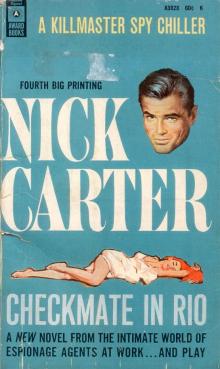 Checkmate in Rio
Checkmate in Rio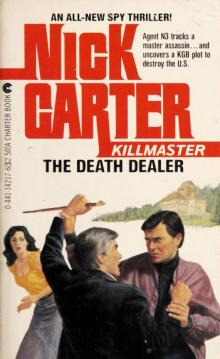 The Death Dealer
The Death Dealer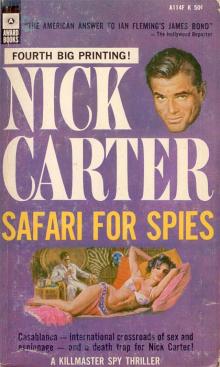 Safari for Spies
Safari for Spies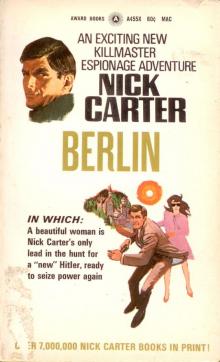 Berlin
Berlin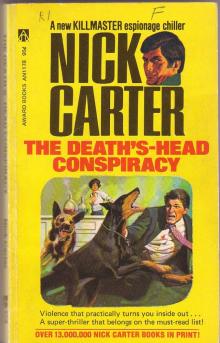 The Death’s Head Conspiracy
The Death’s Head Conspiracy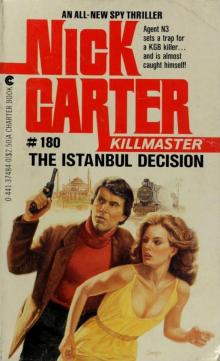 The Istanbul Decision
The Istanbul Decision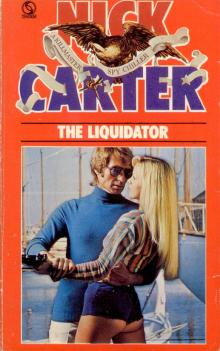 The Liquidator
The Liquidator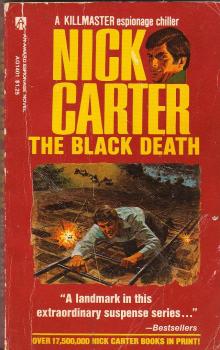 The Black Death
The Black Death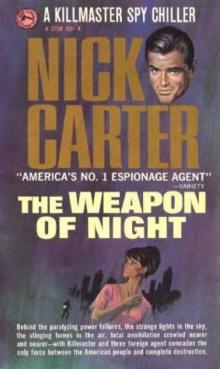 The Weapon of Night
The Weapon of Night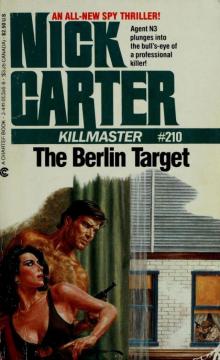 The Berlin Target
The Berlin Target Temple of Fear
Temple of Fear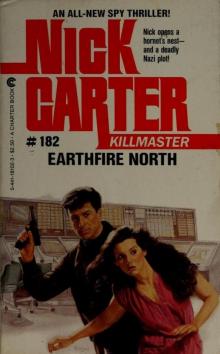 Earthfire North
Earthfire North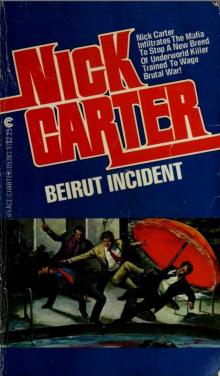 Beirut Incident
Beirut Incident White Death
White Death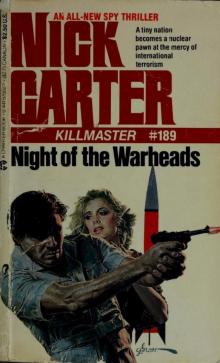 Night of the Warheads
Night of the Warheads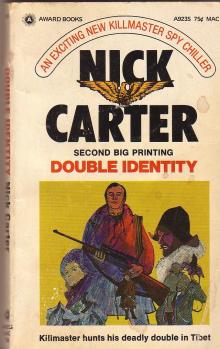 Double Identity
Double Identity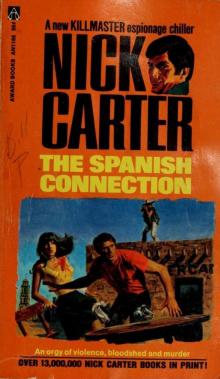 The Spanish Connection
The Spanish Connection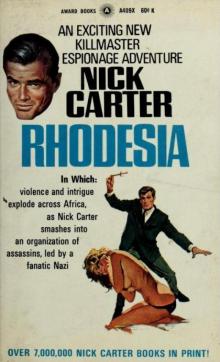 Rhodesia
Rhodesia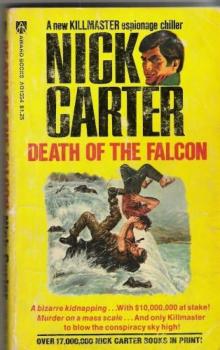 Death of the Falcon
Death of the Falcon The Executioners
The Executioners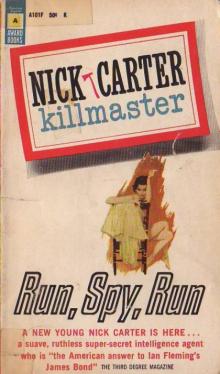 Run, Spy, Run
Run, Spy, Run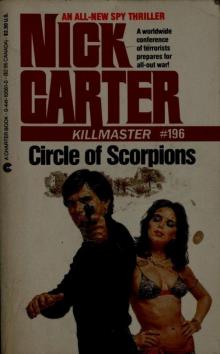 Circle of Scorpions
Circle of Scorpions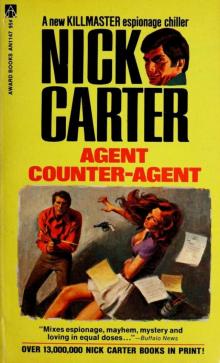 Agent Counter-Agent
Agent Counter-Agent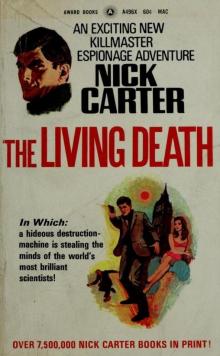 The Living Death
The Living Death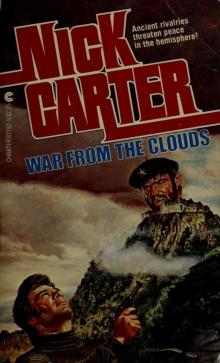 War From The Clouds
War From The Clouds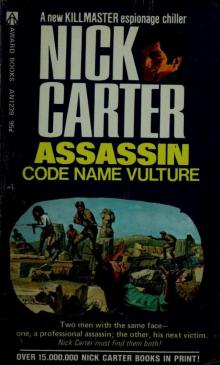 Assassin: Code Name Vulture
Assassin: Code Name Vulture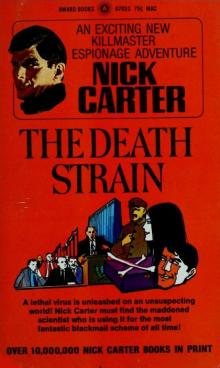 The Death Strain
The Death Strain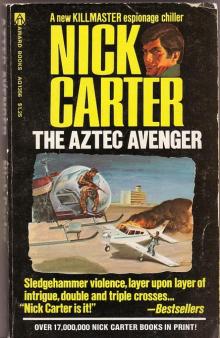 The Aztec Avenger
The Aztec Avenger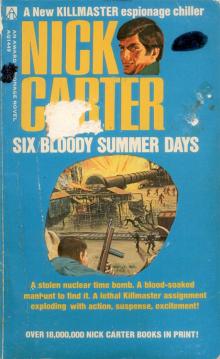 Six Bloody Summer Days
Six Bloody Summer Days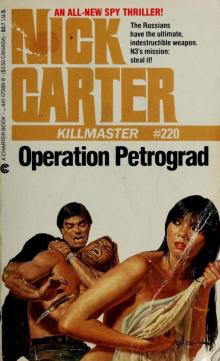 Operation Petrograd
Operation Petrograd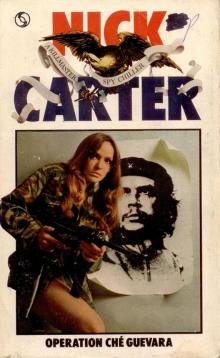 Operation Che Guevara
Operation Che Guevara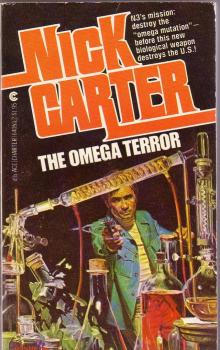 The Omega Terror
The Omega Terror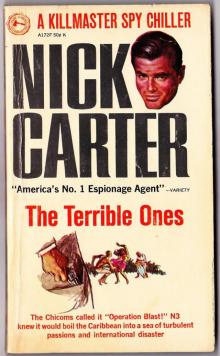 The Terrible Ones
The Terrible Ones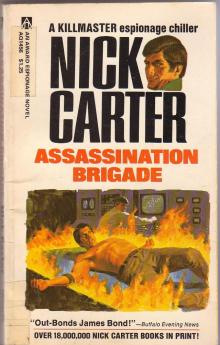 Assassination Brigade
Assassination Brigade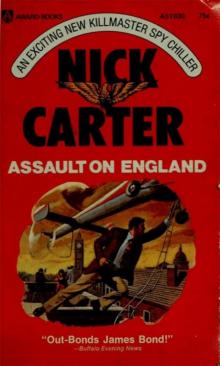 Assault on England
Assault on England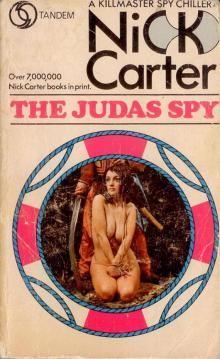 The Judas Spy
The Judas Spy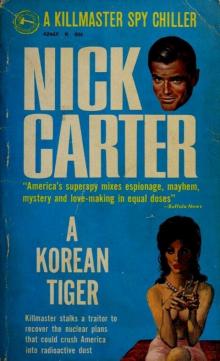 A Korean Tiger
A Korean Tiger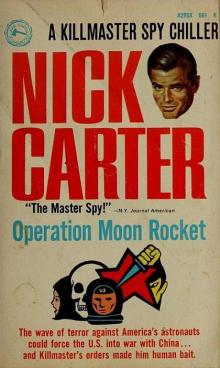 Operation Moon Rocket
Operation Moon Rocket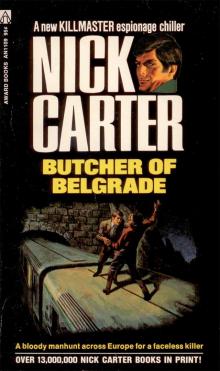 Butcher of Belgrade
Butcher of Belgrade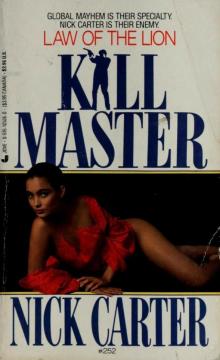 Law of the Lion
Law of the Lion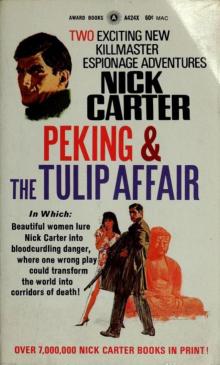 Peking & The Tulip Affair
Peking & The Tulip Affair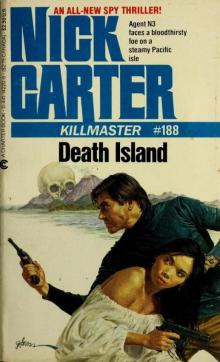 Death Island
Death Island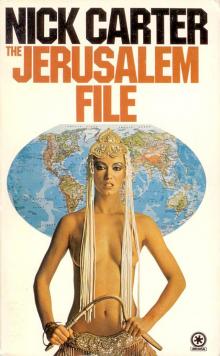 The Jerusalem File
The Jerusalem File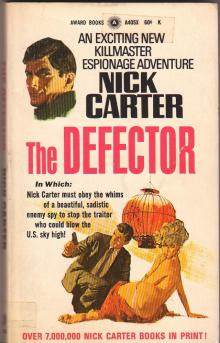 The Defector
The Defector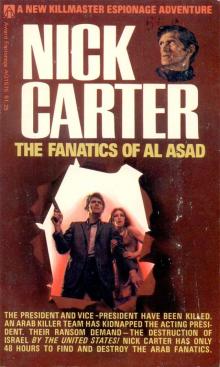 The Fanatics of Al Asad
The Fanatics of Al Asad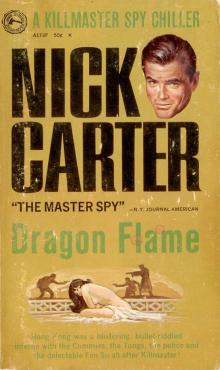 Dragon Flame
Dragon Flame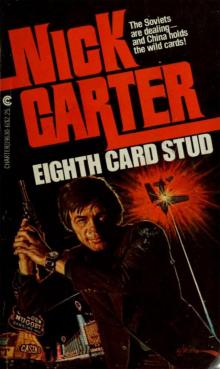 Eighth Card Stud
Eighth Card Stud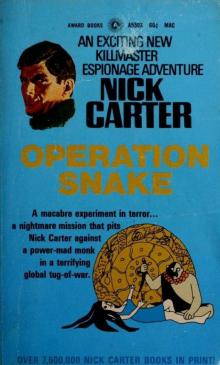 Operation Snake
Operation Snake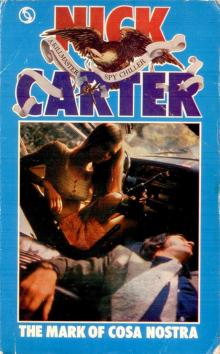 The Mark of Cosa Nostra
The Mark of Cosa Nostra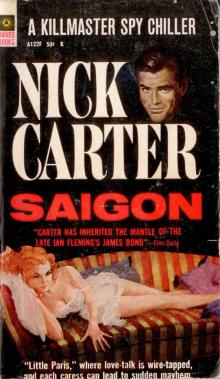 Saigon
Saigon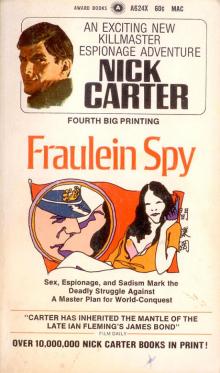 Fraulein Spy
Fraulein Spy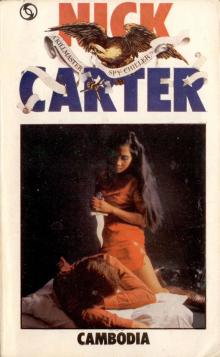 Cambodia
Cambodia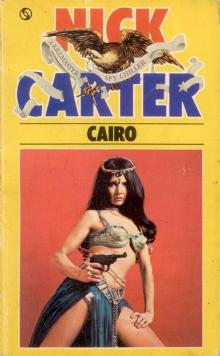 Cairo
Cairo